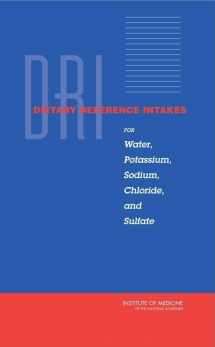
Dietary Reference Intakes for Water, Potassium, Sodium, Chloride, and Sulfate (Dietary Reference Intakes Series)
Book details
Summary
Description
Dietary Reference Intakes for Water, Potassium, Sodium, Chloride, and Sulfate The Dietary Reference Intakes (DRIs) are quantitative estimates of nutrient intakes to be used for planning and assessing diets for healthy people. This new report, the sixth in a series of reports presenting dietary reference values for the intakes of nutrients by Americans and Canadians, establishes nutrient recommendations on water, potassium, and salt for health maintenance and the reduction of chronic disease risk. Dietary Reference Intakes for Water, Potassium, Sodium, Chloride, and Sulfate discusses in detail the role of water, potassium, salt, chloride, and sulfate in human physiology and health. The major findings in this book include the establishment of Adequate Intakes for total water (drinking water, beverages, and food), potassium, sodium, and chloride and the establishment of Tolerable Upper Intake levels for sodium and chloride. The book makes research recommendations for information needed to advance the understanding of human requirements for water and electrolytes, as well as adverse effects associated with the intake of excessive amounts of water, sodium, chloride, potassium, and sulfate. This book will be an invaluable reference for nutritionists, nutrition researchers, and food manufacturers.
Table of Contents- Front Matter
- Summary
- 1 Introduction to Dietary Reference Intakes
- 2 Overview and Methods
- 3 A Model for the Development of Tolerable Upper Intake Levels
- 4 Water
- 5 Potassium
- 6 Sodium and Chloride
- 7 Sulfate
- 8 Applications of Dietary Reference Intakes for Electrolytes and Water
- 9 A Research Agenda
- Appendix A: Glossary and Acronyms
- Appendix B: Origin and Framework of the Development of Dietary Reference Intakes
- Appendix C: Predictions of Daily Water and Sodium Requirements
- Appendix D: U.S. Dietary Intake Data from the Third National Health and Nutrition Examination Survey, 1988-1994
- Appendix E: U.S. Dietary Intake Data for Water and Weaning Foods from the Continuing Survey of Food Intakes by Individuals, 1994-1996, 1998
- Appendix F: Canadian Dietary Intake Data for Adults from Ten Provinces, 1990-1997
- Appendix G: U.S. Water Intake and Serum Osmolality Data from the Third National Health and Nutrition Examination Survey, 1988-1994
- Appendix H: U.S. Total Water Intake Data by Frequency of Leisure Time Activity from the Third National Health and Nutrition Examination Survey, 1988-1994
- Appendix I: Dose-Response Effects of Sodium Intake on Blood Pressure
- Appendix J: Serum Electrolyte Concentrations NHANES III, 1988-94
- Appendix K: Options for Dealing with Uncertainties
- Appendix L: Acknowledgments
- Appendix M: Biographical Sketches of Panel Members
- Index


We would LOVE it if you could help us and other readers by reviewing the book
Book review



